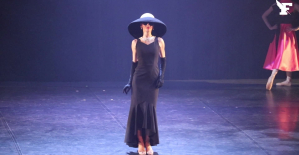The body was just 31 years old, but the wreckage of a man still lay in New York's Stuyvesand Polyclinic. He had already suffered several breakdowns, he would never be able to repay the debts - and in any case it was unthinkable that the life of this screen star could return to any kind of calm, a existence with a meaningful task, a private life and friendships. And so it is hardly surprising that on August 23, 1926, Rudolph Valentino closed his eyes forever at a relatively young age.
Fame is one of the greatest promises of modernity. Not a boy or girl who wouldn't dream of being admired by millions upon millions. Of course, no one says that there is hardly anyone who will ever be able to endure what it means to always be the center of attention, not to take a step without being observed, to be constantly judged by strangers - and to deal with the question of whether you actually deserve it all.
"Live fast, die young" was the motto of the rock'n'roll generation - Valentino can be regarded as one of their predecessors. He had not chosen life as a sex symbol. Rodolfo Pietro Filiberto Raffaello di Valentina d'Antonguella was born on May 6, 1895 in Castellaneta, Italy, the son of a military veterinarian. The father died in 1906, after which the son attracted attention primarily because of his flighty character. He was always skipping school and hanging out with the wrong people. He actually wanted to join the navy, but then they suspected how little the young man was suited to military drill.
In this way he obtained a meaningless diploma certifying him as a farmer, without ever having considered practicing this profession. In 1912 he spent a few months in Paris - and when he had squandered his entire inheritance, his family decided that was enough. The twisted scion should go to the new world and conquer his fate there with hard work. But his lifestyle didn't improve there: he worked as a waiter and car washer in New York and got involved in a few minor scams.
The key to his rise was his appearances as a dancer in various clubs, where the better society of Manhattan was a guest. Here he made contact with an operetta troupe, with whom he traveled the country in the years that followed, ending up in San Francisco in 1917. He soon made his first smaller films, and then his breakthrough in 1919: the director Rex Ingram and the screenwriter June Mathis discovered him in a production and allowed him to take part in the film "The Four Horsemen of the Apocalypse". A great success, which made Rudolph Valentino, as he called himself for some time because of the pronunciation, a public figure in a very short time.
His screen fame increased in 1921 with his role in The Sheikh. As a reminder: It was the time of the silent films, so Valentino could not cover up with text what he might lack in body tension and other charisma during a long day of shooting. A strenuous activity that was not least characterized by monotony. Until his death, Valentino practically only received offers that showed him as a Latin lover; he serves as an early example that the American film industry inhibits the development of artistic talent with the technique of "type casting".
Valentino himself was aware of this. It didn't make him happy: "Women don't love me, they love what they see of me on the screen. I'm the canvas that women paint their dreams on," he said in an interview, saying something that still applies to Hollywood mimes like Brad Pitt to this day; living on sex appeal inspires envy, but the guy in front of the camera is only a man. For the 20's star, that meant there was nothing off the screen that would remotely succeed with the opposite sex.
His first marriage, to actress Jean Acker in 1919, was a PR stunt. She was a lesbian and put him in front of the door of their hotel suite on their wedding night. The divorce was official in 1923, although Valentino had previously married actress Natacha Rambova and had to pay a $10,000 fine for bigamy. The connection was so difficult that in 1924 the beloved actor attempted suicide with a revolver; a colleague just stopped him. Then in 1926 the end - but nothing that would have given Valentino any relief. An affair with colleague Paola Negri seems to have only increased the suffering.
To make matters worse, conservative media such as the "Chicago Tribune" accompanied his work with a campaign: it was said that he was responsible for the softening of the American man as such, or editors wrote of a "living powder puff". Jealousy resonated with every word, but these attacks should definitely have hit Valentino.
Was death, under these circumstances, a salvation? Nobody will dare to decide that. What is certain, however, is that New York gave him no peace even after his death. The hysteria was boundless, 100,000 people lined the streets as the body was buried. The Bible says: You shall not make yourself a graven image. One does not have to be a Christian to admit that the image people made of Rudolph Valentino was instrumental in his early downfall.
You can also find "World History" on Facebook. We are happy about a like.

 Germany: the trial of an AfD leader, accused of chanting a Nazi slogan, resumes this Tuesday
Germany: the trial of an AfD leader, accused of chanting a Nazi slogan, resumes this Tuesday New York: at Columbia University, the anti-Semitic drift of pro-Palestinian demonstrations
New York: at Columbia University, the anti-Semitic drift of pro-Palestinian demonstrations What is Akila, the mission in which the Charles de Gaulle is participating under NATO command?
What is Akila, the mission in which the Charles de Gaulle is participating under NATO command? Lawyer, banker, teacher: who are the 12 members of the jury in Donald Trump's trial?
Lawyer, banker, teacher: who are the 12 members of the jury in Donald Trump's trial? What High Blood Pressure Does to Your Body (And Why It Should Be Treated)
What High Blood Pressure Does to Your Body (And Why It Should Be Treated) Vaccination in France has progressed in 2023, rejoices Public Health France
Vaccination in France has progressed in 2023, rejoices Public Health France Food additives suspected of promoting cardiovascular diseases
Food additives suspected of promoting cardiovascular diseases “Even morphine doesn’t work”: Léane, 17, victim of the adverse effects of an antibiotic
“Even morphine doesn’t work”: Léane, 17, victim of the adverse effects of an antibiotic Orthodox bishop stabbed in Sydney: Elon Musk opposes Australian injunction to remove videos on X
Orthodox bishop stabbed in Sydney: Elon Musk opposes Australian injunction to remove videos on X One in three facial sunscreens does not protect enough, warns L'Ufc-Que Choisir
One in three facial sunscreens does not protect enough, warns L'Ufc-Que Choisir What will become of the 81 employees of Systovi, a French manufacturer of solar panels victim of “Chinese dumping”?
What will become of the 81 employees of Systovi, a French manufacturer of solar panels victim of “Chinese dumping”? “I could lose up to 5,000 euros per month”: influencers are alarmed by a possible ban on TikTok in the United States
“I could lose up to 5,000 euros per month”: influencers are alarmed by a possible ban on TikTok in the United States Dance, Audrey Hepburn’s secret dream
Dance, Audrey Hepburn’s secret dream The series adaptation of One Hundred Years of Solitude promises to be faithful to the novel by Gabriel Garcia Marquez
The series adaptation of One Hundred Years of Solitude promises to be faithful to the novel by Gabriel Garcia Marquez Racism in France: comedian Ahmed Sylla apologizes for “having minimized this problem”
Racism in France: comedian Ahmed Sylla apologizes for “having minimized this problem” Mohammad Rasoulof and Michel Hazanavicius in competition at the Cannes Film Festival
Mohammad Rasoulof and Michel Hazanavicius in competition at the Cannes Film Festival Skoda Kodiaq 2024: a 'beast' plug-in hybrid SUV
Skoda Kodiaq 2024: a 'beast' plug-in hybrid SUV Tesla launches a new Model Y with 600 km of autonomy at a "more accessible price"
Tesla launches a new Model Y with 600 km of autonomy at a "more accessible price" The 10 best-selling cars in March 2024 in Spain: sales fall due to Easter
The 10 best-selling cars in March 2024 in Spain: sales fall due to Easter A private jet company buys more than 100 flying cars
A private jet company buys more than 100 flying cars This is how housing prices have changed in Spain in the last decade
This is how housing prices have changed in Spain in the last decade The home mortgage firm drops 10% in January and interest soars to 3.46%
The home mortgage firm drops 10% in January and interest soars to 3.46% The jewel of the Rocío de Nagüeles urbanization: a dream villa in Marbella
The jewel of the Rocío de Nagüeles urbanization: a dream villa in Marbella Rental prices grow by 7.3% in February: where does it go up and where does it go down?
Rental prices grow by 7.3% in February: where does it go up and where does it go down? Europeans: “All those who claim that we don’t need Europe are liars”, criticizes Bayrou
Europeans: “All those who claim that we don’t need Europe are liars”, criticizes Bayrou With the promise of a “real burst of authority”, Gabriel Attal provokes the ire of the opposition
With the promise of a “real burst of authority”, Gabriel Attal provokes the ire of the opposition Europeans: the schedule of debates to follow between now and June 9
Europeans: the schedule of debates to follow between now and June 9 Europeans: “In France, there is a left and there is a right,” assures Bellamy
Europeans: “In France, there is a left and there is a right,” assures Bellamy These French cities that will boycott the World Cup in Qatar
These French cities that will boycott the World Cup in Qatar Serie A: Bologna surprises AS Rome in the race for the C1
Serie A: Bologna surprises AS Rome in the race for the C1 Serie A: Marcus Thuram king of Italy, end of the debate for the position of number 9 with the Blues?
Serie A: Marcus Thuram king of Italy, end of the debate for the position of number 9 with the Blues? Milan AC-Inter Milan: Thuram and Pavard impeccable, Hernandez helpless… The tops and flops of the derby
Milan AC-Inter Milan: Thuram and Pavard impeccable, Hernandez helpless… The tops and flops of the derby Ligue 2: Auxerre leader, Bordeaux in crisis, play-offs... 5 questions about an exciting end of the season
Ligue 2: Auxerre leader, Bordeaux in crisis, play-offs... 5 questions about an exciting end of the season


















